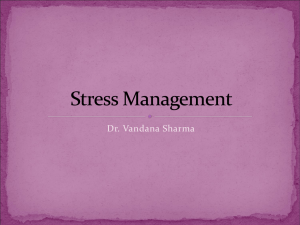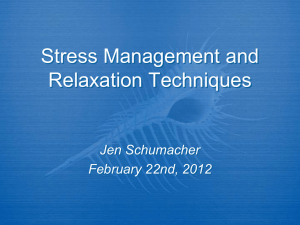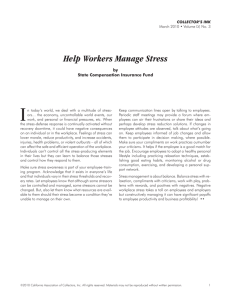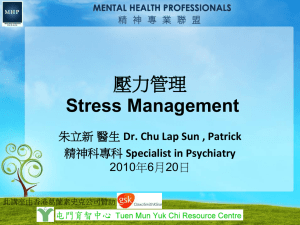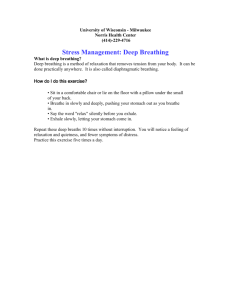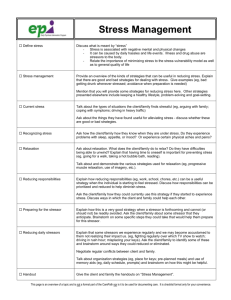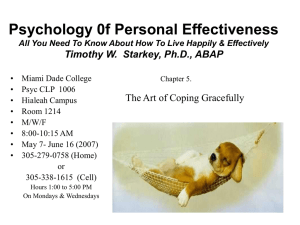Staying Healthy in a High Stress World
advertisement
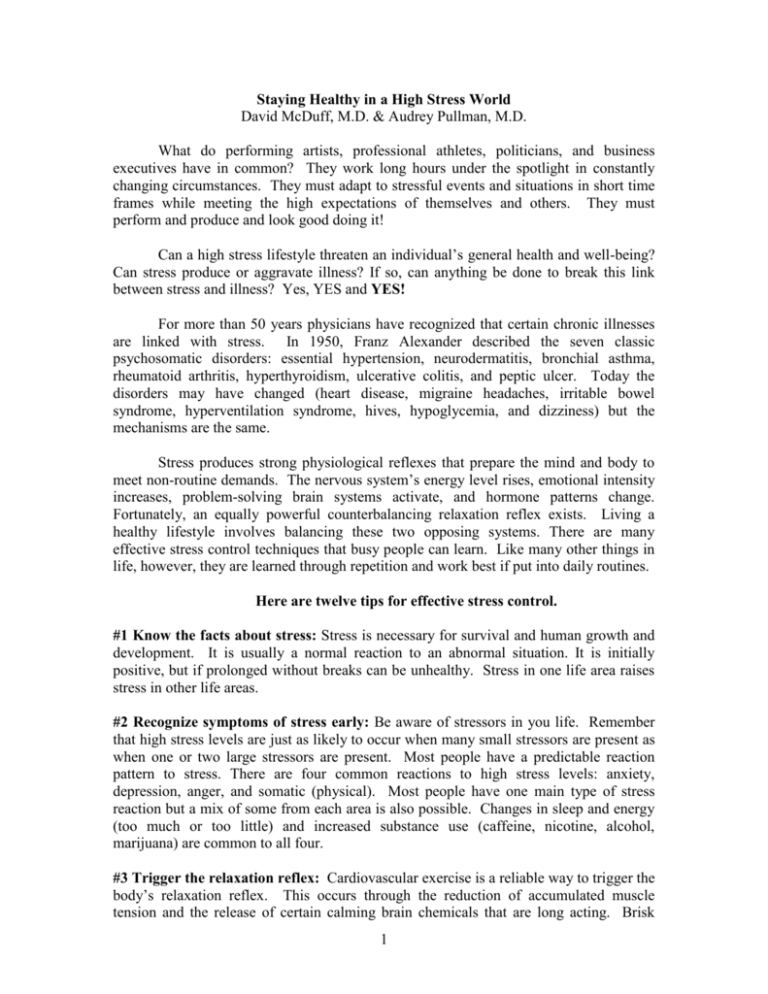
Staying Healthy in a High Stress World David McDuff, M.D. & Audrey Pullman, M.D. What do performing artists, professional athletes, politicians, and business executives have in common? They work long hours under the spotlight in constantly changing circumstances. They must adapt to stressful events and situations in short time frames while meeting the high expectations of themselves and others. They must perform and produce and look good doing it! Can a high stress lifestyle threaten an individual’s general health and well-being? Can stress produce or aggravate illness? If so, can anything be done to break this link between stress and illness? Yes, YES and YES! For more than 50 years physicians have recognized that certain chronic illnesses are linked with stress. In 1950, Franz Alexander described the seven classic psychosomatic disorders: essential hypertension, neurodermatitis, bronchial asthma, rheumatoid arthritis, hyperthyroidism, ulcerative colitis, and peptic ulcer. Today the disorders may have changed (heart disease, migraine headaches, irritable bowel syndrome, hyperventilation syndrome, hives, hypoglycemia, and dizziness) but the mechanisms are the same. Stress produces strong physiological reflexes that prepare the mind and body to meet non-routine demands. The nervous system’s energy level rises, emotional intensity increases, problem-solving brain systems activate, and hormone patterns change. Fortunately, an equally powerful counterbalancing relaxation reflex exists. Living a healthy lifestyle involves balancing these two opposing systems. There are many effective stress control techniques that busy people can learn. Like many other things in life, however, they are learned through repetition and work best if put into daily routines. Here are twelve tips for effective stress control. #1 Know the facts about stress: Stress is necessary for survival and human growth and development. It is usually a normal reaction to an abnormal situation. It is initially positive, but if prolonged without breaks can be unhealthy. Stress in one life area raises stress in other life areas. #2 Recognize symptoms of stress early: Be aware of stressors in you life. Remember that high stress levels are just as likely to occur when many small stressors are present as when one or two large stressors are present. Most people have a predictable reaction pattern to stress. There are four common reactions to high stress levels: anxiety, depression, anger, and somatic (physical). Most people have one main type of stress reaction but a mix of some from each area is also possible. Changes in sleep and energy (too much or too little) and increased substance use (caffeine, nicotine, alcohol, marijuana) are common to all four. #3 Trigger the relaxation reflex: Cardiovascular exercise is a reliable way to trigger the body’s relaxation reflex. This occurs through the reduction of accumulated muscle tension and the release of certain calming brain chemicals that are long acting. Brisk 1 walking with a partner several times per week is a good place to start. Stress breathing is shallow and rapid and uneven whereas relaxation breathing is deep and smooth and slow. There are breathing techniques (controlled rapid breath, diagrammatic breathing, patterned breath-in four, hold seven, out eight) that can be mastered. Massage, music, movies, meditation, muscle stretching and meals are also reliable triggers. #4 Think positively and make yourself look calm and in control: The mind and body have repetitive patterns of thinking, emotion, facial expression, posture, and movement that are associated with good stress control and life balance. It is definitely true that actions follow thoughts and certain facial expressions like smiling are associated with better emotional control. Making yourself maintain a calm and confident outward appearance can lead you out of a cycle of stress more quickly. #5 Develop a support network: Most individuals need several people who they trust and whose advice they can obtain quickly and easily. The main purpose is to talk about your stressors and to put them into perspective. Consider a combination of family, friends and colleagues. Notice those around you who seem to manage stress well. Learn from their example and ask for their advice. If this is not effective then seek assistance from a spiritual advisor, physician, or therapist. #6 Take regular breaks from the demands of work: The mind and the body operate in high stress periods using energy that is stored in the chemical systems of the brain, muscles, liver, and certain glands. These chemical supplies can be depleted if recovery breaks are not strategically inserted into each day, month and year. Short breaks (20-30 minutes) every six to eight hours are often enough to allow for energy resupply. Longer breaks (days to weeks) with a complete work disconnect are often helpful after prolonged periods of exertion. Breaks should have different tasks than the demands of work and should and trigger enjoyment, humor, laughter, and relaxation. #7 Improve time management skills: Break down the day into smaller time blocks and accomplish at least one task during each. It is better to complete one small task (or a small part of a larger one) in each time block than fail to complete a larger task that day. #8 Stay informed-get the facts-ignore rumors: Incorrect information can lead to false perceptions/opinions, unnecessary thinking and hightenened emotions that drain energy. Seek out the source of rumors and regularly get an update on the situation even if little change has occurred. Small bits of information can lead to new solutions. #9 Consider a spiritual or religious solution: Spiritual views often help us to see our problems in different ways and may enhance our natural creativity. Solutions to stress are often just around the corner if we allow enough time to pass and maintain our optimism. #10: Avoid excessive sedatives and stimulants: The use of alcohol, marijuana, nicotine, and caffeine often increase during periods of high stress. Sedatives and stimulants are often used together and can lead to risky dosage escalations in short periods of time. These may bring temporary relief but can often lead to insomnia and rebound anxiety. Limit alcohol if stressed and monitor stimulant intake. As little as three alcohol drinks, five hundred milligrams of caffeine (4-6 cups of coffee) or twenty 2 milligrams of nicotine (20 cigarettes or ½ tin of dip) a day can interfere with sleep duration and quality and raise stress. #11 Have fun at work and develop an enjoyable hobby: It is critical to have fun in work and play. Laughter and humor should be present throughout the day. If work is not fun then look at the people around you and change the mix. Consider adding someone who is calming or can lighten the mood. After work or during vacations find a hobby that uses different skills and that is not as high pressure or results oriented. Find a way to enjoy the process and share it with others. #12 Develop positive routines, record positive moments and visualize success: Try to start and end each day with series of patterned but flexible actions that last 30-60 minutes. An awakening routine that raises your energy levels and prepares you for action should be developed. This might include breath work, exercising, reading, meditation, and a meal. A mid day routine such as a meal, social conversation, or a walk can be used to recover lost energy and maintain focus and concentration. An end of the day routine is needed to shift from action to calm and prepare for sleep. This might include listening to soft music, reading, calling a support network member, or meditation. At the end of the day it is often useful to formally register the positive moments. Review them in detail to allow the sights, sounds, and positive emotions to be fully imprinted. Spend some time visualizing success for the next day or for a longer period of an important project or life event. Allow the images to be strong and clear. Every professional has a characteristic stress response that develops during high demand periods. This response usually consists of anxiety, depression, anger, physical pain/dysfunction or some combination. These responses drain energy and change sleep. If unchecked they can result in burnout or illness. Fortunately stress recovery breaks and the body’s relaxation reflex can effectively counterbalance stress’s disruptive effects. Consultation from a physician skilled in alternative medicine or performance enhancement training techniques can usually identify unique features of each individual’s stress and relaxation responses. An individualized, empowerment–based stress control plan can then be developed. Dr. David McDuff is an addiction psychiatrist and behavioral sports medicine physician who has taught stress control techniques to professional athletes and health professionals for 25 years. He is a retired Army Colonel with combat experience and the founding Director of MD Sports Performance, a consulting company for athletes, business executives, and other performing professionals (www.mdsports.net) Dr. Audrey Pullman is a psychiatrist and behavioral medicine physician who was a stage and television performer before pursuing a career in medicine. She blends alternative medicine and stress control techniques into her work with performing arts professionals. 3
